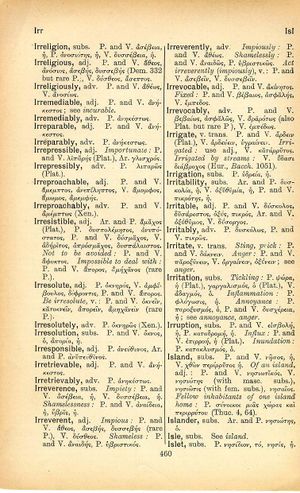irritate: Difference between revisions
From LSJ
τὸ ἀνάλημμα καὶ τὴν ἐπ' αὐτοῦ κερκίδα → the retaining wall and the wedge of theatre seats supported by it
(D_5) |
(Gf-D_5) |
||
| Line 1: | Line 1: | ||
{{Woodhouse1 | {{Woodhouse1 | ||
|Text=[[File:woodhouse_460.jpg|thumb|link= | |Text=[[File:woodhouse_460.jpg|thumb | ||
|link={{filepath:woodhouse_460.jpg}}]]'''v. trans.''' | |||
<b class="b2">Sting, prick</b>: P. and V. δάκνειν. | <b class="b2">Sting, prick</b>: P. and V. δάκνειν. | ||
<b class="b2">Anger</b>: P. and V. παροξύνειν, V. ὀργαίνειν, ὀξύνειν; see [[anger]]. | <b class="b2">Anger</b>: P. and V. παροξύνειν, V. ὀργαίνειν, ὀξύνειν; see [[anger]]. | ||
| Line 8: | Line 9: | ||
}} | }} | ||
{{Gaffiot | {{Gaffiot | ||
|gf=<b>irrītātē</b>, en excitant la colère || -[[tius]] Amm. 22, 15, 19. | |gf=<b>irrītātē</b>, en excitant la colère || -[[tius]] Amm. 22, 15, 19.||-[[tius]] Amm. 22, 15, 19. | ||
}} | }} | ||

